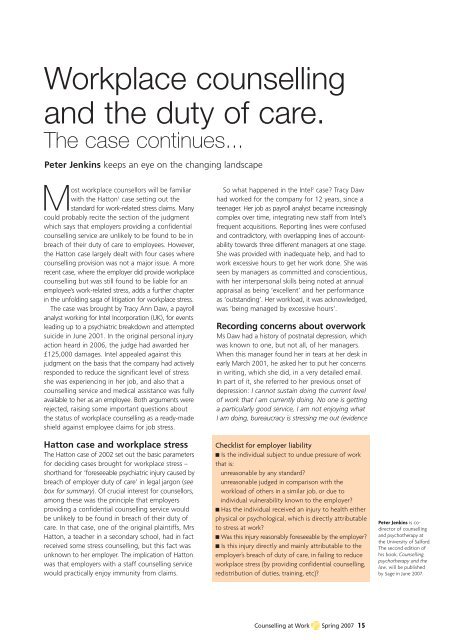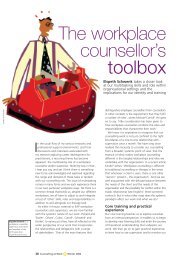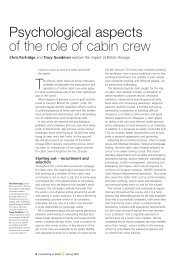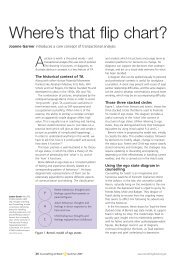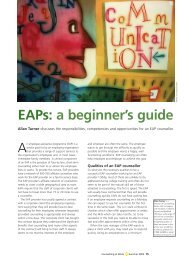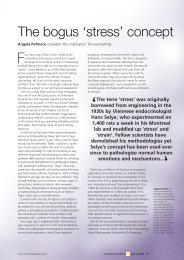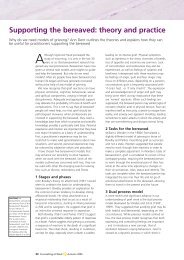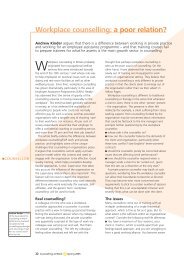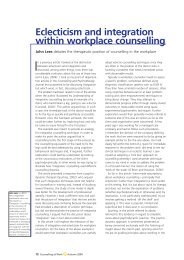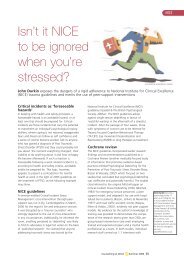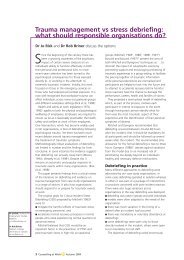Workplace counselling and the duty of care. - BACP Workplace
Workplace counselling and the duty of care. - BACP Workplace
Workplace counselling and the duty of care. - BACP Workplace
Create successful ePaper yourself
Turn your PDF publications into a flip-book with our unique Google optimized e-Paper software.
<strong>Workplace</strong> <strong>counselling</strong><br />
<strong>and</strong> <strong>the</strong> <strong>duty</strong> <strong>of</strong> <strong>care</strong>.<br />
The case continues...<br />
Peter Jenkins keeps an eye on <strong>the</strong> changing l<strong>and</strong>scape<br />
Most workplace counsellors will be familiar<br />
with <strong>the</strong> Hatton 1 case setting out <strong>the</strong><br />
st<strong>and</strong>ard for work-related stress claims. Many<br />
could probably recite <strong>the</strong> section <strong>of</strong> <strong>the</strong> judgment<br />
which says that employers providing a confidential<br />
<strong>counselling</strong> service are unlikely to be found to be in<br />
breach <strong>of</strong> <strong>the</strong>ir <strong>duty</strong> <strong>of</strong> <strong>care</strong> to employees. However,<br />
<strong>the</strong> Hatton case largely dealt with four cases where<br />
<strong>counselling</strong> provision was not a major issue. A more<br />
recent case, where <strong>the</strong> employer did provide workplace<br />
<strong>counselling</strong> but was still found to be liable for an<br />
employee’s work-related stress, adds a fur<strong>the</strong>r chapter<br />
in <strong>the</strong> unfolding saga <strong>of</strong> litigation for workplace stress.<br />
The case was brought by Tracy Ann Daw, a payroll<br />
analyst working for Intel Incorporation (UK), for events<br />
leading up to a psychiatric breakdown <strong>and</strong> attempted<br />
suicide in June 2001. In <strong>the</strong> original personal injury<br />
action heard in 2006, <strong>the</strong> judge had awarded her<br />
£125,000 damages. Intel appealed against this<br />
judgment on <strong>the</strong> basis that <strong>the</strong> company had actively<br />
responded to reduce <strong>the</strong> significant level <strong>of</strong> stress<br />
she was experiencing in her job, <strong>and</strong> also that a<br />
<strong>counselling</strong> service <strong>and</strong> medical assistance was fully<br />
available to her as an employee. Both arguments were<br />
rejected, raising some important questions about<br />
<strong>the</strong> status <strong>of</strong> workplace <strong>counselling</strong> as a ready-made<br />
shield against employee claims for job stress.<br />
Hatton case <strong>and</strong> workplace stress<br />
The Hatton case <strong>of</strong> 2002 set out <strong>the</strong> basic parameters<br />
for deciding cases brought for workplace stress –<br />
shorth<strong>and</strong> for ‘foreseeable psychiatric injury caused by<br />
breach <strong>of</strong> employer <strong>duty</strong> <strong>of</strong> <strong>care</strong>’ in legal jargon (see<br />
box for summary). Of crucial interest for counsellors,<br />
among <strong>the</strong>se was <strong>the</strong> principle that employers<br />
providing a confidential <strong>counselling</strong> service would<br />
be unlikely to be found in breach <strong>of</strong> <strong>the</strong>ir <strong>duty</strong> <strong>of</strong><br />
<strong>care</strong>. In that case, one <strong>of</strong> <strong>the</strong> original plaintiffs, Mrs<br />
Hatton, a teacher in a secondary school, had in fact<br />
received some stress <strong>counselling</strong>, but this fact was<br />
unknown to her employer. The implication <strong>of</strong> Hatton<br />
was that employers with a staff <strong>counselling</strong> service<br />
would practically enjoy immunity from claims.<br />
So what happened in <strong>the</strong> Intel 2 case Tracy Daw<br />
had worked for <strong>the</strong> company for 12 years, since a<br />
teenager. Her job as payroll analyst became increasingly<br />
complex over time, integrating new staff from Intel’s<br />
frequent acquisitions. Reporting lines were confused<br />
<strong>and</strong> contradictory, with overlapping lines <strong>of</strong> accountability<br />
towards three different managers at one stage.<br />
She was provided with inadequate help, <strong>and</strong> had to<br />
work excessive hours to get her work done. She was<br />
seen by managers as committed <strong>and</strong> conscientious,<br />
with her interpersonal skills being noted at annual<br />
appraisal as being ‘excellent’ <strong>and</strong> her performance<br />
as ‘outst<strong>and</strong>ing’. Her workload, it was acknowledged,<br />
was ‘being managed by excessive hours’.<br />
Recording concerns about overwork<br />
Ms Daw had a history <strong>of</strong> postnatal depression, which<br />
was known to one, but not all, <strong>of</strong> her managers.<br />
When this manager found her in tears at her desk in<br />
early March 2001, he asked her to put her concerns<br />
in writing, which she did, in a very detailed email.<br />
In part <strong>of</strong> it, she referred to her previous onset <strong>of</strong><br />
depression: I cannot sustain doing <strong>the</strong> current level<br />
<strong>of</strong> work that I am currently doing. No one is getting<br />
a particularly good service, I am not enjoying what<br />
I am doing, bureaucracy is stressing me out (evidence<br />
Checklist for employer liability<br />
■ Is <strong>the</strong> individual subject to undue pressure <strong>of</strong> work<br />
that is:<br />
unreasonable by any st<strong>and</strong>ard<br />
unreasonable judged in comparison with <strong>the</strong><br />
workload <strong>of</strong> o<strong>the</strong>rs in a similar job, or due to<br />
individual vulnerability known to <strong>the</strong> employer<br />
■ Has <strong>the</strong> individual received an injury to health ei<strong>the</strong>r<br />
physical or psychological, which is directly attributable<br />
to stress at work<br />
■ Was this injury reasonably foreseeable by <strong>the</strong> employer<br />
■ Is this injury directly <strong>and</strong> mainly attributable to <strong>the</strong><br />
employer’s breach <strong>of</strong> <strong>duty</strong> <strong>of</strong> <strong>care</strong>, in failing to reduce<br />
workplace stress (by providing confidential <strong>counselling</strong>,<br />
redistribution <strong>of</strong> duties, training, etc)<br />
Peter Jenkins is codirector<br />
<strong>of</strong> <strong>counselling</strong><br />
<strong>and</strong> psycho<strong>the</strong>rapy at<br />
<strong>the</strong> University <strong>of</strong> Salford.<br />
The second edition <strong>of</strong><br />
his book, Counselling,<br />
psycho<strong>the</strong>rapy <strong>and</strong> <strong>the</strong><br />
law, will be published<br />
by Sage in June 2007.<br />
Counselling at Work Spring 2007 15
legal update<br />
by my violent mood swings – bad sign ... been here before<br />
– twice), HR/PX are demoralising me <strong>and</strong> I want out.<br />
The company responded by restructuring <strong>and</strong> by seeking<br />
to employ an additional member <strong>of</strong> staff, but this post was<br />
not filled. Ms Daw’s health continued to worsen, <strong>and</strong> in<br />
May 2001 she saw her GP, who recorded: Depressed<br />
again gradual [increase] in symptoms over [six months]<br />
due [to] stress at work – working 50-60 hours/week ...<br />
Does not want time <strong>of</strong>f work.<br />
In June, after seeing occupational health, she was<br />
signed <strong>of</strong>f work for three weeks by her GP for depression,<br />
<strong>and</strong> <strong>the</strong>n attempted suicide.<br />
In many ways, this runs a course which is probably all<br />
too familiar to many workplace counsellors. However, a<br />
crucial difference is that <strong>the</strong> company had provided<br />
<strong>counselling</strong> for employees. In fact, Ms Daw had previously<br />
had eight sessions <strong>of</strong> <strong>counselling</strong> from Intel’s <strong>counselling</strong><br />
service, when first <strong>of</strong>f work with postnatal depression,<br />
for a period <strong>of</strong> four months. On <strong>the</strong> second occasion,<br />
she had been <strong>of</strong>f work for almost a year, <strong>and</strong> had been<br />
under community psychiatric <strong>care</strong>.<br />
Intel: <strong>counselling</strong> inside<br />
The judge rejected Intel’s claim that <strong>the</strong> <strong>counselling</strong> provision<br />
discharged <strong>the</strong>ir <strong>duty</strong> <strong>of</strong> <strong>care</strong> 3 , <strong>and</strong> that Ms Daw should<br />
have made proper use <strong>of</strong> this service. In fact, <strong>the</strong> latter had<br />
detailed some perceived limitations <strong>of</strong> <strong>the</strong> service, not set<br />
out in <strong>the</strong> judgment. These reservations may have underpinned<br />
her use <strong>of</strong> psychiatric services, ra<strong>the</strong>r than <strong>of</strong> <strong>the</strong><br />
<strong>counselling</strong> service, during her second episode <strong>of</strong> depression.<br />
While <strong>the</strong> judge conceded that ‘<strong>the</strong>re will be cases in<br />
which an employee may be expected to take refuge in<br />
<strong>counselling</strong> services’, this was clearly not one <strong>of</strong> <strong>the</strong>m.<br />
Significantly, <strong>the</strong> judge found that ‘whe<strong>the</strong>r <strong>the</strong> <strong>counselling</strong><br />
service provided will be enough to discharge an employer’s<br />
<strong>duty</strong> depends on <strong>the</strong> facts <strong>of</strong> each case’. In o<strong>the</strong>r words,<br />
<strong>the</strong> mere fact <strong>of</strong> providing an employee <strong>counselling</strong> service<br />
does not, on its own, eliminate <strong>the</strong> employer’s legal liability<br />
for <strong>the</strong> welfare <strong>of</strong> its staff. In essence, <strong>the</strong> judge decided<br />
that this was a case <strong>of</strong> poor management, which failed to<br />
take urgent <strong>and</strong> appropriate action to deal with a known<br />
problem – an insupportable <strong>and</strong> stressful level <strong>of</strong> overwork.<br />
On <strong>the</strong> face <strong>of</strong> it, this case seems to mark a fresh<br />
departure in terms <strong>of</strong> law on workplace stress, throwing<br />
everything up in <strong>the</strong> air for each case to be argued afresh<br />
on its own merits. However, this would be to misread <strong>the</strong><br />
signs. A <strong>care</strong>ful reading <strong>of</strong> <strong>the</strong> small print <strong>of</strong> <strong>the</strong> Hatton<br />
judgment suggests that <strong>the</strong> Intel case actually fits very<br />
closely within its template, ra<strong>the</strong>r than breaking <strong>the</strong> mould.<br />
The fine print <strong>of</strong> Hatton made it clear that <strong>counselling</strong><br />
provision would not reduce liability where <strong>the</strong> employer<br />
‘has been placing totally unreasonable dem<strong>and</strong>s upon an<br />
individual in circumstances where <strong>the</strong> risk <strong>of</strong> harm was<br />
clear’ 1 . So this case still sits firmly within <strong>the</strong> logic <strong>of</strong> Hatton<br />
– <strong>the</strong> employer was found to be acting unreasonably,<br />
despite <strong>the</strong> provision <strong>of</strong> a <strong>counselling</strong> service.<br />
Role <strong>of</strong> workplace <strong>counselling</strong><br />
So far, so good. However, <strong>the</strong> case still raises some<br />
difficult questions about <strong>the</strong> way that workplace<br />
<strong>counselling</strong> is perceived by <strong>the</strong> judiciary. The Hatton<br />
case was clearly based on <strong>the</strong> judge’s <strong>care</strong>ful<br />
annotation <strong>of</strong> various stress publications produced by<br />
<strong>the</strong> Health <strong>and</strong> Safety Executive, but was noticeably<br />
silent on <strong>the</strong> relative effectiveness <strong>of</strong> workplace<br />
<strong>counselling</strong> services. In <strong>the</strong> Intel case, <strong>the</strong> judge was<br />
sceptical <strong>of</strong> <strong>the</strong> value <strong>of</strong> short-term <strong>counselling</strong> in<br />
being able to help Ms Daw with her depression. Her<br />
decision not to make use <strong>of</strong> <strong>counselling</strong> on this, <strong>the</strong><br />
third <strong>of</strong> her episodes <strong>of</strong> depression, was, <strong>the</strong>refore,<br />
seen to be a reasonable one. While client choice is<br />
an important factor, current research indicates that<br />
short-term <strong>counselling</strong> can be an effective option,<br />
to be considered in cases <strong>of</strong> depression. According<br />
to <strong>the</strong> NICE guidelines on depression 4 , ‘In both mild<br />
<strong>and</strong> moderate depression, psychological treatment<br />
specifically focused on depression (such as problemsolving,<br />
brief CBT <strong>and</strong> <strong>counselling</strong>) <strong>of</strong> six to eight<br />
sessions over 10 to 12 weeks should be considered’,<br />
particularly when combined with antidepressant<br />
medication.<br />
Second, <strong>the</strong> judgment appears to see a relatively<br />
limited role for workplace <strong>counselling</strong> in such cases,<br />
restricted to making a referral to <strong>the</strong> GP, <strong>and</strong> to<br />
alerting management to <strong>the</strong> urgent action needed<br />
in an individual case. <strong>Workplace</strong> <strong>counselling</strong> is seen<br />
here primarily as an arm <strong>of</strong> occupational health,<br />
with limited potential for its pr<strong>of</strong>essional autonomy<br />
<strong>and</strong> its own recognised expertise – it provides,<br />
essentially, a referral route to o<strong>the</strong>r services. While<br />
this may well be appropriate, it begs <strong>the</strong> question<br />
<strong>of</strong> whe<strong>the</strong>r early access to <strong>counselling</strong> might, on its<br />
own, be sufficient to accurately assess a risk <strong>of</strong> suicide,<br />
or allay <strong>the</strong> severity <strong>of</strong> actual depression, ra<strong>the</strong>r<br />
than simply serve as a conduit to o<strong>the</strong>r services.<br />
Despite <strong>the</strong> continuing lack <strong>of</strong> clarity about <strong>the</strong><br />
potential role <strong>of</strong> workplace <strong>counselling</strong> with regard<br />
to mitigating workplace stress, this recent case adds<br />
to our underst<strong>and</strong>ing <strong>of</strong> employer <strong>duty</strong> <strong>of</strong> <strong>care</strong>. In<br />
o<strong>the</strong>r words, ‘good’ <strong>counselling</strong> does not compensate<br />
for ‘bad’ management in <strong>the</strong> litigation lottery. Or as<br />
<strong>the</strong> judge put it, <strong>counselling</strong> is definitely not to be<br />
considered as ‘a panacea’ when it comes to deciding<br />
<strong>the</strong> limits to employer <strong>duty</strong> <strong>of</strong> <strong>care</strong>. ■<br />
References<br />
1 Hatton v Su<strong>the</strong>rl<strong>and</strong> [2002] 2 All ER 1<br />
2 Intel Incorporation Ltd UK v Tracy Ann Daw [2007]<br />
EWCA Civ 70<br />
3 Intel owed depressed employee more than <strong>counselling</strong>.<br />
www.OUT-Law.com 12/2/2007<br />
4 National Institute <strong>of</strong> Health <strong>and</strong> Clinical Excellence.<br />
Depression: management <strong>of</strong> depression in primary <strong>and</strong><br />
secondary <strong>care</strong>. London: NICE; 2004.<br />
16 Counselling at Work Spring 2007


